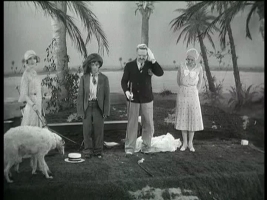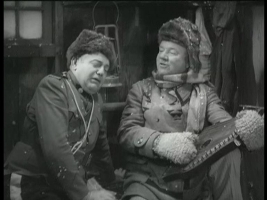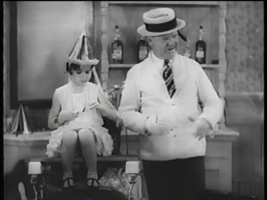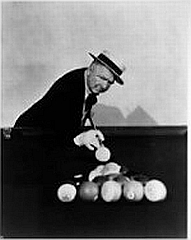W.C. FIELDS SHORTS 1930 - 1933
THE GOLF SPECIALIST
(1930)With W. C. Fields, Al Wood, Shirley Grey
Directed by Monte Brice
Black and White
Reviewed by JL
 In this
early two-reel talkie, Fields
recreates one of his most famous stage sketches, "An Incident
on
the Links", a piece had he had used on Broadway many
times
over the years in the annual Ziegfield Follies, as well as several
times in silent features. However, this was the first time the
routine would be filmed with sound; indeed, it was the first
time Fields himself would be heard on film.
For that alone, The Golf
Specialist is a historically important film.
In this
early two-reel talkie, Fields
recreates one of his most famous stage sketches, "An Incident
on
the Links", a piece had he had used on Broadway many
times
over the years in the annual Ziegfield Follies, as well as several
times in silent features. However, this was the first time the
routine would be filmed with sound; indeed, it was the first
time Fields himself would be heard on film.
For that alone, The Golf
Specialist is a historically important film.
The
Golf Specialist
is also important because, owing to the primitive way it was
filmed, with
phony sound stages standing in for a golf course, and a camera shooting
the routine straight on from one angle, the short gives us an
excellent facsimile of what Fields
was like on stage. The routine itself is very funny, one of
the best Fields ever created.
Like Laurel and Hardy, Fields could take a simple everyday situation,
in this case, teeing off on a golf course, and find endless ways to
milk comic material out of it. Clubs bend as Fields swings
them,
the papers his caddy wrapped his lunch in keep blowing in Fields's way,
an encounter with the caddy's pie makes everything Fields touches stick
to himself or to other things, people keep walking by for various
reason just before he is read to swing - in fact, so much happens over
the ten minute routine, he never does get to hit the golf
ball!  - JB
- JB
THE DENTIST
(1932)With W. C. Fields, Majorie "Baby" Kane, Elise Cavanna, Arthur Gray, Zedna Farley
Directed by Leslie Pearce
Black and White
Reviewed by JB
Another recreation of one of Fields's standard stage sketches, with some domestic gags and golf gags thrown in, The Dentist presents us with a Fields who is frustrated and angry - in his home life, in his leisure life and in his work. As most Fields fans know, a frustrated Fields is a funny Fields. His dentist (unnamed throughout) may not rank among his most likable characters, but likability hardly matters in this short. He spends much of the alloted twenty minutes complaining about everything that crosses his path, including the ice man, ducks in a pond, his caddy, his patients - no one is safe from his wrath. Even when he accidentally knocks out an older gentlement on the green with his errant drive, he shows no sympathy. "Get those teeth out of there too," he says to the man's friends as they drag the injured party off the green. "They're right in my line of shot!".
The Dentist, the first of four shorts Fields would make for famed comedy producer Mack Sennett, is notable for a cast that includes two of the finest unsung second bananas of all time. Bud Jamison, who plays Fields' golf buddy Charlie Frobisher, was a movie veteran by 1932, and would eventually appear in over 400 films. He was a supporting player for such great comics as Chaplin and Harold Lloyd, but is probably best remembered today for his work at Columbia with The Three Stooges.
Elise Cavanna, a
favorite of
the comedian, was tall and thin ("You are the most
appreciative long piece of string I ever met" wrote Fields to his
friend Elise in 1934) and almost a doppelganger of Carol Burnett. The
actress would appear in three out of the four Sennett shorts and make a
lasting mark on Fields fans. She had a chemistry with "The
Great
Man" only matched later by such actresses as Kathleen Howard and Jan
Duggan. Here she plays a patient who gets tangled up with her
dentist in such a suggestive way, TV censors edited out most of the
scene years later (it was later restored).  - JB
- JB
THE FATAL GLASS OF BEER
(1933)With W. C. Fields, Rosemary Theby, George Chandler, Rychard Cramer
Directed by Clyde Bruckman
Black and White
Reviewed by JB
 A recreation of
the Fields stage sketch "The
Stolen Bonds", The Fatal Glass of Beer
was a film that Mack Sennett
hated and audiences and many movie distributors loathed. A
satire
of movie and stage melodramas, the short
has aged well, , like a fine, surrealistic
wine.
Although fans looking for typical Fields humor may wish to
look
elsewhere, those who wish they could have been in a Broadway audience
in the 1920s watching Fields go through his comic paces should treasure
this film, as well as the three other Sennett shorts and the earlier The Golf Specialist.
The routines, jokes and gags Fields used to offer to theater
audiences were all captured, almost word for word and gag for gag, in
these films. Some fans (like author Simon Louvish (The Man on the Flying Trapeze: The Life and
Times of W.C. Fields)
find this film side-splitting, others (such as me) find it more
bizarrely fascinating than laugh-out-loud funny.
A recreation of
the Fields stage sketch "The
Stolen Bonds", The Fatal Glass of Beer
was a film that Mack Sennett
hated and audiences and many movie distributors loathed. A
satire
of movie and stage melodramas, the short
has aged well, , like a fine, surrealistic
wine.
Although fans looking for typical Fields humor may wish to
look
elsewhere, those who wish they could have been in a Broadway audience
in the 1920s watching Fields go through his comic paces should treasure
this film, as well as the three other Sennett shorts and the earlier The Golf Specialist.
The routines, jokes and gags Fields used to offer to theater
audiences were all captured, almost word for word and gag for gag, in
these films. Some fans (like author Simon Louvish (The Man on the Flying Trapeze: The Life and
Times of W.C. Fields)
find this film side-splitting, others (such as me) find it more
bizarrely fascinating than laugh-out-loud funny.
The Fatal Glass of Beer is better watched than described, but I must note its most famous running gag. Whenever gold prospecter Fields open the door to his shack, looks out on the snow storm outside and says "And it ain't a fit night out for man nor beast!", an unseen stagehand throws a handful of snow (probably cornflakes) directly in his face. A bit of silly stage business now immortalized forever.
Two other notes on this short: Fields' son in this film is named Chester. When Fields would later appear on radio programs sponsored by Lucky Strike cigarettes, who would often talk about his son Chester, a gag the Lucky Strike company eventually figured out: Chester Fields (Chesterfields) was the name of a rival cigarette company! Another bit of business Fields took from this short was the title song, which he changed the words to and re-used for a sketch on a Lucky Strike program.
THE PHARMACIST
(1933)With W. C. Fields, Marjorie "Babe" Kane, Elise Cavanna, Grady Sutton
Directed by Arthur Ripley
Black and White
Reviewed by JB
The Pharmacist is one of my top three favorite short films, along with Buster Keaton's One Week and Laurel and Hardy's Hog Wild. The material, once again taken from a Fields stage sketch ("The Drugstore") is surefire, even eighty years later. Field would even later adapt this sketch for radio where it played just as well even without some of the visual gags. A perfect companion to the classic feature IT'S A GIFT, The Pharmacist has Fields running a general store much like the one he would in the later film. Aside from having to deal with customers ranging from irritating to half-insane, Fields must deal with a bratty daughter prone to eating canaries and coughing up feathers at the dinner table. A customer on the phone asks for half a box of cough drops to be delivered 18 miles way ("I'll send our truck out right away!" says Fields) while a man who doesn't seem to know what he wants provides Fields with an opportunity to take a small swipe at the Democrats (the comedian was not a fan of Roosevelt or the New Deal) when he find out stamps don't come in purple ("A person ain't got any rights in this country any more - the government even tells you what color stamps you gotta buy!"). In a fun self-mocking moment, Fields even tries to sell this gentleman a W. C. Fields puppet ("Rather amusing little beggar!"). With it's tophat and checkered pants, the puppet is unmistakably modeled after Fields stage and screen character Professor Eustace McGargle, from the play Poppy and the film SALLY OF THE SAWDUST.
The shootout between police and
a bandit
which
concludes the film introduces actor Grady Sutton, who would go on to
co-star with Fields in two unforgettable films: THE MAN ON THE FLYING
TRAPEZE and THE
BANK DICK.  ½ - JB
½ - JB
THE BARBER SHOP
(1933)With W. C. Fields, Elise Cavanna, Harry Watson, Dagmar Oakland, John. St. Clair, Cyril Ring, Fay Holderness
Directed by Arthur Ripley
Black and White
Reviewed by JB
 The
Barber Shop is
the most relaxed, easy-going short Fields made for Sennett and is
top-loaded with the kind of verbal nonsense Fields fans love ("Mr.
Lincoln used to tell riddles, and that as much as anything esle made
him the wonderful president that he was!"). Set in the
fictional
town of Felton City (population 873, two feet below sea level and said
to have the largest insane asylum in the state), The Barber Shop
breezes along from scene to scene, as Fields uses lines and situations
he has not had a chance to feature in his three other shorts.
His
barber character, Cornelius O'Hare, is that rarest of Fields creation
who is almost completely content. He begins his day by
sitting
outside, chatting with passing neighbors, and muttering sarcastic
asides to a friend (a tribute to his mother, who had the same habit).
He enjoys listening to the awful riddles his son Ronald tells
at
the breakfast table, has fun joining in a kids baseball game
outside his barber shop, and loves playing his upright bass
(he
has no talent, and plays it as a percussion instrument). His
biggest disappointment in life is that his wife, a vegetarian, refuses
to cook meat. Yet this Fields character, and the short he is
in,
is still funny, filled with memorable lines and surrealistic sight
gags.
The
Barber Shop is
the most relaxed, easy-going short Fields made for Sennett and is
top-loaded with the kind of verbal nonsense Fields fans love ("Mr.
Lincoln used to tell riddles, and that as much as anything esle made
him the wonderful president that he was!"). Set in the
fictional
town of Felton City (population 873, two feet below sea level and said
to have the largest insane asylum in the state), The Barber Shop
breezes along from scene to scene, as Fields uses lines and situations
he has not had a chance to feature in his three other shorts.
His
barber character, Cornelius O'Hare, is that rarest of Fields creation
who is almost completely content. He begins his day by
sitting
outside, chatting with passing neighbors, and muttering sarcastic
asides to a friend (a tribute to his mother, who had the same habit).
He enjoys listening to the awful riddles his son Ronald tells
at
the breakfast table, has fun joining in a kids baseball game
outside his barber shop, and loves playing his upright bass
(he
has no talent, and plays it as a percussion instrument). His
biggest disappointment in life is that his wife, a vegetarian, refuses
to cook meat. Yet this Fields character, and the short he is
in,
is still funny, filled with memorable lines and surrealistic sight
gags.
If only Fields had a chance to make about twenty or thirty more of these shorts, but then again....
It was not to be. Paramount
would sign him for a multi-picture contract around the time The Barber Shop
was released, so we may not have more than a handful of great Fields
two-reelers, but we should certainly be happy we got all those
wonderful Paramount Fields features.  -
JB
-
JB


